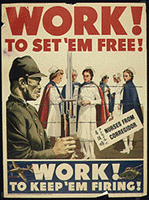Fading Lights: Australian POWs and BCOF Troops in Japan 1945-52
薄れゆく光 – 1945年から1952年の日本におけるオーストラリア人捕虜と英連邦占領軍
Japan's Mitsubishi makes prisoners of war apology
BBC, 19 July 2015
Only two living survivors could be located to accept the apology, and, only Mr Murphy was fit enough to make the trip to Los Angeles, local media reported [...] Mr Murphy told US media earlier that he spent a year at a copper mine near Hanawa, an experience he described as "a complete horror". "It was slavery in every way: no food, no medicine, no clothing, no sanitation," he said, adding that it was all the more galling to know that Mitsubishi built fighter aircraft used against American forces.
Nagasaki residents seek to remember POWs who died in local camp
Asahi Shimbun, 29 January 2014
Students happily dash about in a soccer game on a playing field at Koyagi Junior High School on a recent day in this port city, known worldwide for the atomic bombing in August 1945 that killed tens of thousands instantly. On this site, residents are hoping to erect a monument to remember another legacy that Nagasaki shares from World War II. Here, more than 70 prisoners of war from Allied nations died while in captivity.
Robin Gertser, 2008
Award-winning history of Australian BCOF troops in Japan 1946-52.
Twilight Liberation: Australian Prisoners of War Between Hiroshima and Home
Hugh Clarke, 1986
A collection of stories and testimony by Australian POWs complied by Hugh Clarke.
Mitsubishi to apologise to POWs
The West Australian, 22 July 2015
Mitsubishi Materials may move to apologise to former British, Dutch and Australian World War II POWs, according to a non-executive director of the Japanese construction manufacturer.

Allied POWS Under the Japanese
Roger Mansell
Site for the detailed study of Allied POWS of the Japanese during World War II.
Hugh Clarke, 1983
Former Australian POW Hugh Clarke's sobering recollections of prisoner life in Fukoka Camp # 2 on the island of Koyagi, south of Nagasaki.
"The primary objective of BCOF was to enforce the terms of the unconditional surrender that had ended the war the previous
September. The task of exercising military government over Japan was the responsibility of the United States forces. BCOF was required to maintain military control and to supervise the demilitarisation and disposal of the remnants of Japan's war making capacity."






